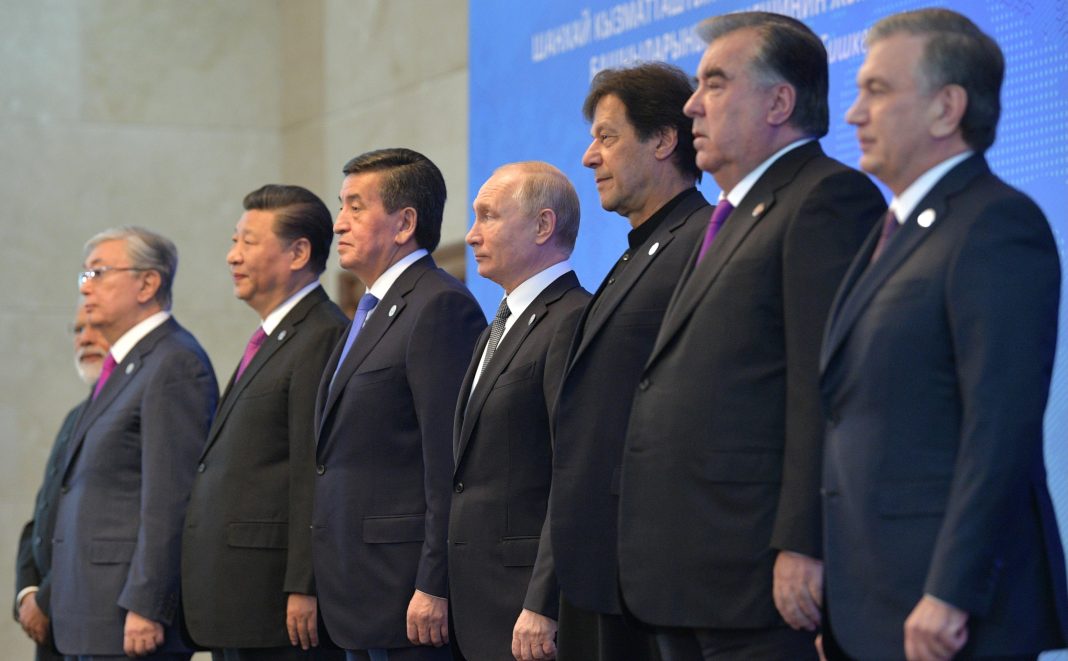The 24th summit of the Shanghai Cooperation Organisation (SCO), held in Astana in early July, attracted quite a lot of international attention. And this is not surprising. In terms of geography, the SCO member countries cover 62 per cent of Eurasia, have 41 per cent of the world’s population, and produce about a third of the world’s GDP. However, these figures cannot be automatically converted into the organisation’s international influence. Even with such countries as China, India and Russia in its ranks, the SCO, in terms of its “weight”, is still in the status of “hopeful” and cannot boast of other practical successes besides the expansion of the organisation.
Nevertheless, the current interest in the Astana summit is largely due to the new geopolitical realities and the acute phase of confrontation between Russia and China on the one hand and the United States and the European Union on the other. At the same time, attempts to portray the SCO as an analogue of NATO or to present it as a broad front against the West do not yet look convincing.
In this article, Ascolta analyses the results of the 24th summit of the Shanghai Cooperation Organisation, as well as examines the prospects for the SCO’s further development and the chances of its reformatting into a global organisation with its own weight and influence in the geopolitical arena.
This Content Is Only For Subscribers
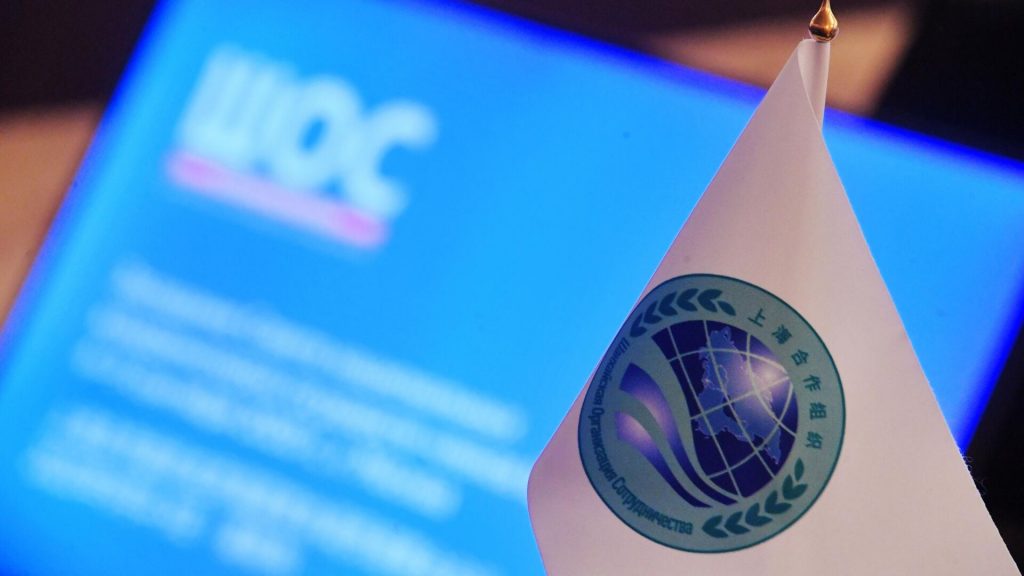
Before talking about the SCO and its future prospects, it is necessary to clearly understand some fundamental aspects. Firstly, the SCO is not an alliance or a group of like-minded people who are united by discipline and commitments. Second, apart from Russia and Iran, no one is in acute conflict with the West there. Even the People’s Republic of China, being the object of an increasingly tight containment policy on the part of the United States, prefers to avoid direct confrontation, not to mention India, Pakistan or the Central Asian states. They see their task as maintaining balance, sustainability and, most importantly, minimising the risks that confrontation is fraught with. So it is virtually impossible to create any alliance against the West on the basis of the SCO. At the same time, the countries united in the SCO do not accept diktat, so the West’s attempts to turn their policy in a direction favourable to it do not work, and this is clearly seen in the example of the Russian-Ukrainian war, which, incidentally, was expectedly not mentioned in the final Astana Declaration, unlike the Palestinian-Israeli conflict, about which the SCO countries have no warnings.
No matter how other countries feel about what is happening, they do not intend to fit into someone else’s political schemes, insisting on the priority of their own interests. Therefore, the SCO is developing as a regional organisation, and it is mainly about Eurasia and the search for opportunities to develop the region in terms of security, economy, transport and logistics infrastructure. Although it should not be concealed that recently, due to the deterioration of relations between the West and China, and even earlier with Russia, this tandem is thinking more and more about global tasks for the organisation, which does not quite coincide with the position of other SCO members.
Birth
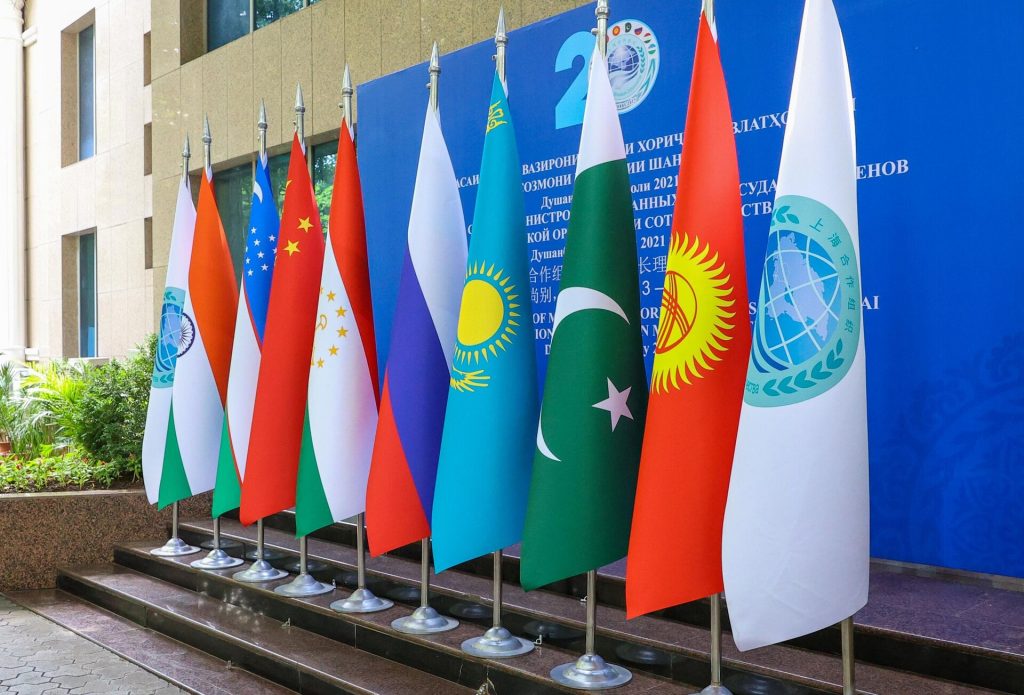
The prerequisites for the establishment of the Shanghai Cooperation Organisation date back to the 1980s, when the USSR and the PRC began negotiations to overcome a protracted diplomatic crisis, also known as the “Sino-Soviet split”. In 1996, the Shanghai Five was formed, comprising Russia, China, Kazakhstan, Kyrgyzstan and Tajikistan. In 1997, another agreement was signed in Moscow on mutual reduction of armed forces in the border area. Summits in 1998 in Almaty (Kazakhstan) and 1999 in Bishkek (Kyrgyzstan) supported the proposal to convene a meeting on interaction and confidence-building measures in Asia, and discussed the fight against cross-border crime and drug trafficking. In 2001, Uzbekistan joined the Shanghai Five, which led to the renaming of the international association as the Shanghai Cooperation Organisation (SCO). The formation of the SCO was finalised in 2002 at a summit in St Petersburg. The Declaration of the Heads of the SCO Member States and the SCO Charter were signed at that time, as well as an agreement on the establishment of the SCO Regional Anti-Terrorist Structure.
The SCO began its existence by resolving border disputes, but it was intended to focus its work on three areas: security, economic development and humanitarian co-operation. The Chinese who initiated the process had their own understanding of why this organisation was being created. Before the emergence of the SCO, there was no structure in the post-Soviet space that included China – all organisations, be it the CSTO military bloc or the CIS balancing between life and zombie status, were closed to Russia. With the emergence of the SCO, the first organisation with a broad mandate, in which China would be a full-fledged participant, appeared in the former Soviet Union, and the geographical focus of the new bloc was directed at the most important for Beijing (apart from Russia) part of the former Soviet empire – Central Asia. The importance of this region for China has been steadily growing since the collapse of the USSR. The situation in the Xinjiang Uygur Autonomous Region bordering Central Asia has been unstable for several decades, so China is interested in security in the neighbouring territories and in combating the export of instability from Afghanistan. Beijing has watched with concern the deployment of U.S. military infrastructure in Uzbekistan and Kyrgyzstan following the start of the Afghan campaign and has sought allies to counter Washington. Finally, since 1994, China had become an importer of hydrocarbons, and the creation of reliable land routes for oil and gas became a top priority for Beijing. In the long term, China was also interested in Central Asian markets for exporting its goods, which meant it needed a platform to discuss the terms of economic co-operation and the possible creation of a free trade zone.
Given Russia’s role in Central Asia, Beijing could not have achieved its goals without Moscow. The SCO was created for this reason. Russia’s and China’s interests in Central Asia coincided in many ways: fighting against the “three evils” (separatism, extremism, terrorism), and in the 2000s Moscow was not at all opposed to laying oil and gas pipelines from the region to China, because these supplies reduced the incentives for Central Asian countries to find routes to Europe bypassing Russia.
The SCO was to be a platform where Beijing and Moscow would jointly develop the rules of the game for Central Asia and then gently impose their collective will on the countries of the region. For China, this would be its first experience of such interaction with another major power in its traditional area of interest, and if the experience was deemed successful, Beijing could then try to use this experience in its interaction with India in the Bay of Bengal region and even with the United States in Southeast Asia.
And if in the security sphere the SCO as a mechanism for coordinating the interests of China and Russia in Central Asia as a whole has taken place. The Regional Anti-Terrorist Structure was launched in Tashkent. Of even greater importance were the military exercises Peace Mission, where the interaction between the Russian and Chinese military is being practised (the other SCO members sent small contingents).
However, in the economic sphere, China has failed to achieve its goals. Since at least 2010, Beijing has been actively promoting two initiatives: the creation of the SCO Development Bank and the SCO Free Trade Zone. The idea of a free trade zone was greeted nervously by almost all of the organisation’s member states: by removing customs barriers, they risked letting many sectors of their economies fall under the roller of China’s huge economic machine. But the idea of a development bank was received much more positively by the Central Asian countries: after the crisis of 2007-2009, many of them needed money badly, and China was ready to provide it on favourable terms. (At the height of the crisis, at the SCO summit in Ekaterinburg, then Chinese President Hu Jintao publicly promised to provide the SCO countries with up to $10bn in preferential loans). But this idea was opposed by Moscow. Thus, two approaches, two views on the SCO development gradually emerged.
Two approaches – one way
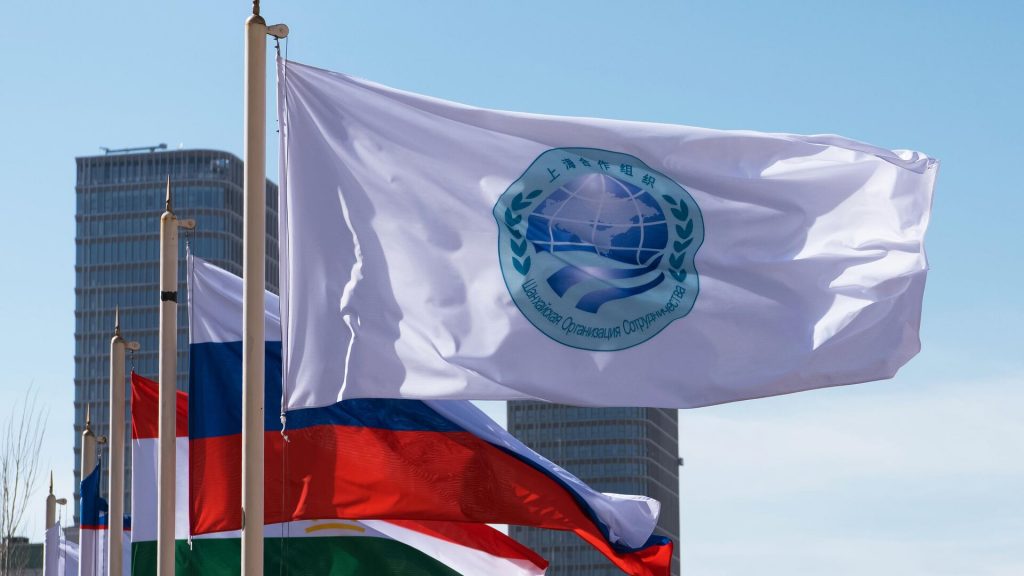
In creating the SCO, Russia hoped for equal status with China. In addition, the political and military aspects of the organisation’s work were at first prioritised, which suited the Kremlin perfectly. The SCO turned out to be just right. In 2005, the leaders of the organisation for the first time raised the issue of the duration of the US military presence in Central Asia. The Chinese became Russia’s perfect allies in forcing the Americans out of the airbase in Manas, Kyrgyzstan. In the field of military and anti-terrorist cooperation with Beijing, Moscow felt quite confident: after all, it is Russia, not China, that has military bases and formal CSTO allies in Central Asia.
However, Beijing’s attempts to expand the SCO agenda into the economic sphere alarmed Moscow: the Kremlin was clearly aware that the economic potential of Russia and China was not comparable. So Russia decided to torpedo the creation of the SCO development bank and free trade zone. And if, as we have already noted, in the case of the free trade zone, Russia did not need any special efforts, Moscow put forward conditions for the bank that were obviously impossible for China. In addition, Russia took another step aimed at counterbalancing China – the expansion of the association at the expense of India. Thus, the SCO would have another major country friendly to Russia.
China resisted this idea for a long time: New Delhi’s accession to the SCO did not fit at all into the scheme of Sino-Russian cooperation in Central Asia. The change in Beijing’s position began in 2013 and was caused by several reasons. Firstly, by that time the Chinese had finally realised that Moscow would not agree to the creation of an SCO development bank and a free trade zone on terms satisfactory to China. Secondly, the Chinese realised that they did not really need the SCO bank to promote their economic interests in Central Asia. After the global crisis, the countries of the region themselves queued up for Chinese money, and Beijing began issuing loans to them on a bilateral basis through its state banks. By lending to individual countries, Beijing was not bound by any multilateral rules and could therefore take full advantage of the difficult situation of the borrowers and extract extremely favourable terms. Russia was completely excluded from this scheme and, moreover, could not resist Beijing’s credit expansion. Second, in 2013, President Xi Jinping formulated the concept of the Silk Road Economic Belt (SREB).
The concept that evolved into the monumental Belt and Road Initiative had enormous advantages over the SCO: it did not imply the creation of an international superstructure with clearly defined rules of behaviour. This approach allowed China to develop relations with any country that expressed interest in the project without looking at other countries. By May 2015, Beijing had signed agreements to link the SREB with the national infrastructure construction programmes of Kazakhstan, Kyrgyzstan and Tajikistan, and on May 8, it crowned the process by signing a statement by Vladimir Putin and Xi Jinping on linking the SREB and the EAEU. The fiscally insignificant Silk Initiative has proved much more convenient for promoting Beijing’s geo-economic interests than the SCO.
After weighing all these circumstances, China finally agreed to admit India to the SCO, but on the condition that Pakistan, China’s main partner in South Asia, join at the same time. Admission of New Delhi and Islamabad, living like cats and dogs, into the SCO could have completely paralysed the work of the organisation, which was already not very effective due to the constant “dissenting opinions” of individual members on various issues (Russia – on the SCO development bank; Tajikistan – on Iran’s accession; Uzbekistan – on the depth of military and anti-terrorist cooperation).
And the SCO against the backdrop of the development of the Belt and Road project is no longer seen as an economic instrument necessary for China. At the Bishkek SCO summit in 2019, only 9 per cent of the documents signed concerned economic issues, while the main topic was regional security and the joint fight against the “three forces of evil”: separatism, terrorism and extremism. However, this topic, like an eastern caravan, has been migrating from summit to summit of the SCO.
China has shown that even without the superstructure it can manage its investments in the SCO member countries and does not need Russia for this. The Russian Federation, understanding that it cannot compete with China economically in the region and focusing on the security of the SCO member states, symbolically left the headquarters and the name of the organisation to China. Thus, albeit with a great strain, the theory of the “division of labour” between Russia and China in Central Asia emerged, which is being transferred to the SCO: Moscow ensures regional security, while Beijing is the main driver of economic development.
Bifurcation points
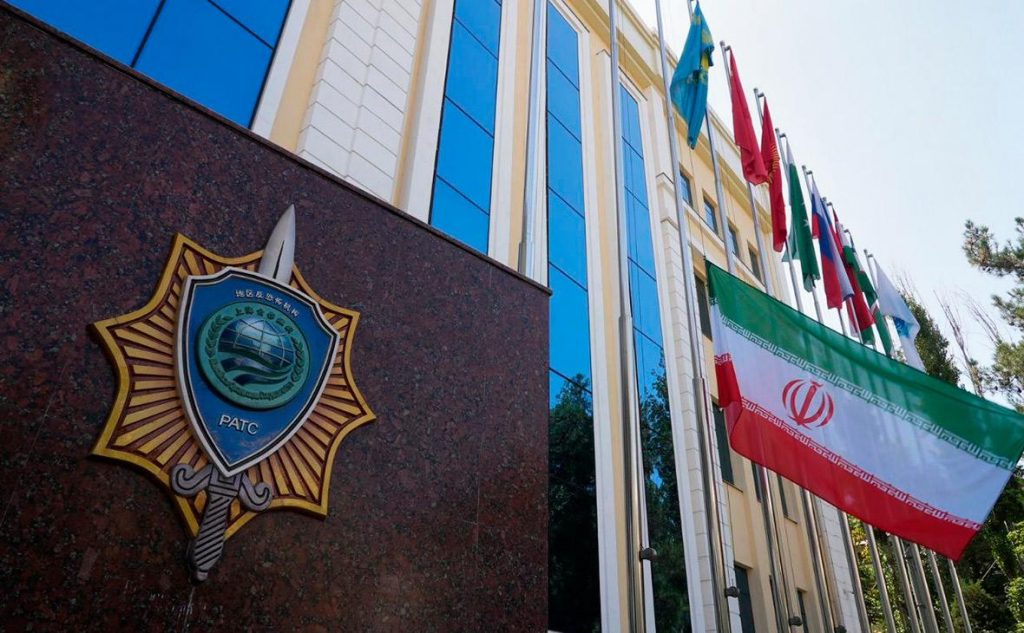
A new stage or a new bifurcation point for the SCO was the accession of Iran. In 2021, at the summit in Tajikistan, it was announced that the procedure for its admission had begun. Tehran received observer status at the SCO back in 2005, after which it applied for full membership in 2008. But until 2015 Iran could not be admitted to the association due to international sanctions against it. According to the SCO rules, a country under UN Security Council sanctions cannot become a member, and Iran was subject to a number of restrictive measures. The sanctions were lifted in 2015 when Tehran agreed to curb its nuclear programme. But even this did not open the door to the SCO.
Unexpectedly, the Iranian bid was blocked by Tajikistan, which had previously enjoyed some of the warmest relations with Iran among all SCO countries. Dushanbe accused Tehran of supporting the Islamic Renaissance Party of Tajikistan and of indirect involvement in organising terrorist acts. Eventually, Tajikistan agreed and the late Iranian President Ebrahim Raisi, for whom it was his first foreign trip, flew to the summit. One of Iran’s main lobbyists was Russia, expecting that this would give the organisation even more weight in the international arena. Iran’s admission to the SCO took place against the backdrop of events in Afghanistan, where the Taliban have already taken control of the entire territory of the country. In this sense, Iran, which borders Afghanistan, became an important participant in discussions on regional security.
The next bifurcation point for the SCO was Russia’s full-scale aggression against Ukraine. It was believed that until 24 February 2022, Russia’s position in Central Asia was stronger than solid. All the more so because this was confirmed just two months before the Russian invasion of Ukraine began. The Russian army under the flags of the Collective Security Treaty Organisation (CSTO) helped Kazakh President Kasym-Jomart Tokayev to hold on to power. It proved that it is Russia, not China, that is the external guarantor of security in the region.
The first SCO summit since the start of the Russian-Ukrainian war was held in September 2022 in Samarkand. Despite the fact that the foreign policy approaches of the SCO member countries largely coincide, however, as they say, there are nuances. Thus, the SCO member states did not demonstrate full unity in voting on the three UN General Assembly resolutions condemning Moscow’s actions adopted in the first year after the beginning of Russia’s military aggression against Ukraine. Although none of the SCO member states supported these documents, only Belarus consistently voted against their adoption together with Russia. The other SCO members either abstained or did not take part in the voting.
Putin and Xi Jinping met on the margins of the SCO summit in Samarkand, at which the Chinese leader was then very restrained about Putin’s assessment that “attempts to create a unipolar world have recently taken on an absolutely ugly shape”. China, along with other summit participants, tried to show Russia that its current narrative did not coincide with their foreign policy priorities. It came to the point that before the SCO summit in Samarkand in 2022, official Tashkent specifically refuted Russian journalists’ theses that “the SCO is Russia’s answer to NATO”.
The next SCO summit, which was held online in New Delhi, was memorable because Iran was officially admitted to the organisation, and the date of its admission on 4 July – US Independence Day was more than “symbolic”. For the first time since 1979 Tehran became a member of a major international association. Iran’s own aspiration to become a member of the SCO was obvious because of Western sanctions and international isolation. And in this, Iran’s situation was very similar to that of Russia after the aggression it unleashed against Ukraine.
No other breakthrough decisions were taken at the summit, which, however, did not surprise anyone and has become a “good” tradition for SCO summits. There were rumours that Modi chose the videoconference mode to avoid receiving Comrade Xi in India. However, Xi Jinping’s voice was heard by all. By this time, not only Russia but China, the two founding countries of the SCO – Russia and China – were in the most acute conflict with the West since the Cold War. For the first time, the SCO summits spoke about threats to regional security, whether veiled, as Xi Jinping had done, or explicitly, as Putin had said.
“The SCO countries should independently develop a foreign policy based on the common and long-term interests of our region. We must remain vigilant against outside attempts to foment a new Cold War and provoke block confrontation in our region, and categorically oppose attempts to interfere from outside and instigate ‘colour revolutions’ under any pretext,” Xi Jinping said in his address, without mentioning the West, but at the same time hinting transparently at where he believes the main external threats to the security and sovereignty of the region’s countries come from. “China is ready to implement the global development initiative with all partners, follow the right direction of economic globalisation, oppose protectionism, unilateral sanctions and the internationalisation of national security,” President Xi continued, also urging “to defend the international system led by the United Nations and the world order based on international law, and to oppose hegemonism and power politics”.
At the end of the summit, its participants adopted the New Delhi Declaration, agreeing to endorse “new comprehensive approaches to promoting fairer and more effective international cooperation. At the same time, the announced SCO Economic Development Strategy for the period until 2030 turned out to be a stumbling block for the organisation’s members. India did not sign the document. Despite the absence of public statements, the probable reason is China’s growing position in the SCO and active promotion of Chinese initiatives. Therefore, India, unlike other members, did not support China’s “One Belt, One Road”, which once again demonstrated the internal contradictions of the SCO, largely caused by the expansion of the organisation.
These problems did not go anywhere at the 24th SCO summit, which took place in Astana in July this year. Firstly, the summit was not honoured by Indian Prime Minister Narendra Modi, who sent his foreign minister to the summit. But the head of China arrived in the capital of Kazakhstan with a state visit, and he was met by the authorities in a much more pompous manner than Vladimir Putin, as if making it clear who is more important for Astana. In addition, the Kazakhstani press paid almost no attention to the Russian president, who was clearly in the shadow of his Chinese counterpart. And no wonder. Since 2013, $9.55 billion has been invested in Kazakhstan as part of the Belt and Road project. In addition, China has become Kazakhstan’s largest trading partner – trade turnover between the countries last year reached $41 billion (for comparison, trade turnover between Russia and Kazakhstan in 2023 was $30 billion). To this we should add that relations between Putin and Kazakh President Kasym-Jomart Tokayev are not the rosiest. The Kazakh leader has his own particular position on the issue of the Russian-Ukrainian war, and has claims to Russia’s actions in the Turkmen, Uzbek and Afghan tracks.
On the whole, the Astana summit was not much different in form from previous forums: an abundance of 24 signed documents, a report on the number of SCO events and other clerical reporting. But there were some nuances that are worth paying attention to. Perhaps for the first time in the framework of the SCO summits, the SCO member states placed the main emphasis in the Astana Declaration on global security issues. Thus, in his address to the SCO, Putin reiterated Russia’s call for the creation of “a new architecture of cooperation, indivisible security and development in Eurasia, designed to replace the outdated Eurocentric and Euro-Atlantic models, which gave unilateral advantages only to individual states”. He was echoed by Xi Jinping, who said that SCO members should strengthen unity and jointly resist external interference in the face of the real challenges of intervention and division.
The changing dynamic in China-Russia relations has become another bifurcation point for the SCO. After years of Russia using blocking to mitigate Chinese influence in the region and not supporting Chinese initiatives such as the SCO Development Bank and the free trade zone, the Kremlin has shifted to closer cooperation with China.
In addition, at the Astana Summit of the SCO, Belarus officially became the 10th member of the organisation. For the SCO, this created a precedent for a country from Eastern Europe to join the organisation, and it thus went beyond Central Asia and Russia’s relations with China. This was a response to the West – the SCO’s advancement to the borders of the European Union. And for Belarus, it opened up an opportunity to get out of the difficult geopolitical situation in which it found itself after 2020-2021, when new sanctions were imposed against it. For Minsk, this is a serious step – it will now be able to build bilateral relations with other members of the organisation through the SCO institutions.
Some experts claim that Russia was the main beneficiary of Belarus’ accession to the SCO. This is both true and not true. Yes, Russia initially supported Belarus’ accession to the SCO. By doing so, it confirmed the status of its main ally and demonstrated that it helps Minsk to expand the number of its international contacts. But one cannot ignore the depth of Belarus’s strategic interaction with China, and Beijing was no less interested in Minsk’s participation than Russia in order to increase the geopolitical weight of the SCO in Eurasia. In addition, Belarus is building quite excellent relations with the countries of Central Asia. Earlier, Alexander Lukashenko praised the SCO for the fact that its participants are “talking on equal terms,” and noted that “all those who are tired of American hegemony look at this structure with respect. It should be recalled that Belarus has been cooperating with the SCO since 2009 – then, together with Sri Lanka, it received the status of a dialogue partner, while in 2015 it became an observer. Today this status is held by Afghanistan and Mongolia. Such countries as Algeria, Bangladesh, East Timor, Vietnam, Israel, Iraq, Syria and Laos have applied for observer status. Armenia, Azerbaijan, Bahrain, Cambodia, Egypt, Qatar, Kuwait, Maldives, Myanmar, Nepal, Saudi Arabia, Sri Lanka, Turkey, Qatar, UAE and Egypt have the status of dialogue partners.
Dialogue partner status allows interested countries to participate in specialised events within the SCO at the invitation of member states. Thus, over the past two decades, the SCO has expanded significantly from its original region in Central Asia to regions such as the South Caucasus, East Asia, the Indian subcontinent and the Middle East. On the eve of the summit, speaking about the new security system, Vladimir Putin said that it should be open to all Eurasian countries, including NATO members. Turkey fits this definition and, incidentally, the country’s President Recep Tayyip Erdogan said at a press conference in Washington during the NATO anniversary summit that Turkey should join the SCO as a permanent member. According to him, he asked all states of the organisation to support him in this matter.
According to the Turkish leader, co-operation with NATO, the SCO and BRICS contributes to “world peace. However, Moscow did not greet Erdogan’s statement with much enthusiasm, noting that there is no exact timeframe for Turkey’s accession to the SCO. Apparently, Putin’s press secretary Dmitry Peskov “forgot” about his chief’s words, noting that there are contradictions related to Turkey’s participation in the North Atlantic Alliance. It should be said that on the margins of the Astana summit Putin and Erdogan held a bilateral meeting, the first since the commanders of the Azov battalion returned to Ukraine with the assistance of the Turkish president, who were supposed to stay on the territory of the latter until the end of hostilities, as agreed by Russia, Ukraine and Turkey. This event is forgotten when people start to wonder why Vladimir Putin has not yet come to visit Recep Tayyip Erdoğan as planned. We venture to suggest that the real reason is precisely because of what happened then in violation of all agreements between these people. The parties talked about insufficient trade turnover and the construction of the Akkuyu nuclear power plant in Turkey, the first unit of which should be operational in a few months, and it will be extremely difficult to do this because of the position of Siemens, which is not in a hurry to fulfil its contractual obligations. In addition, the two leaders discussed the possibility of resolving the crisis in Syria. At the end of the meeting, Erdogan urged Putin to come to Turkey as soon as possible.
Returning to the SCO, and why Erdogan needs it, we note that Turkey’s geographical position historically dictates the different vectors of its policy. On the one hand, Turkey is knocking on the door of the EU and is a member of NATO, on the other hand, it wants to have good relations with Russia. Because it understands its importance, including in the South Caucasus, the Black Sea, on the Ukrainian issue and in Central Asia, where Ankara has its sights set on. Therefore, Turkey is trying to put its eggs in different baskets, showing the West that it has an alternative, and showing China and Russia that Turkey is an independent political player with the NATO bloc at its back. In short, Erdogan is trying to “run between the drops and stay dry” as usual.
A tangle of contradictions
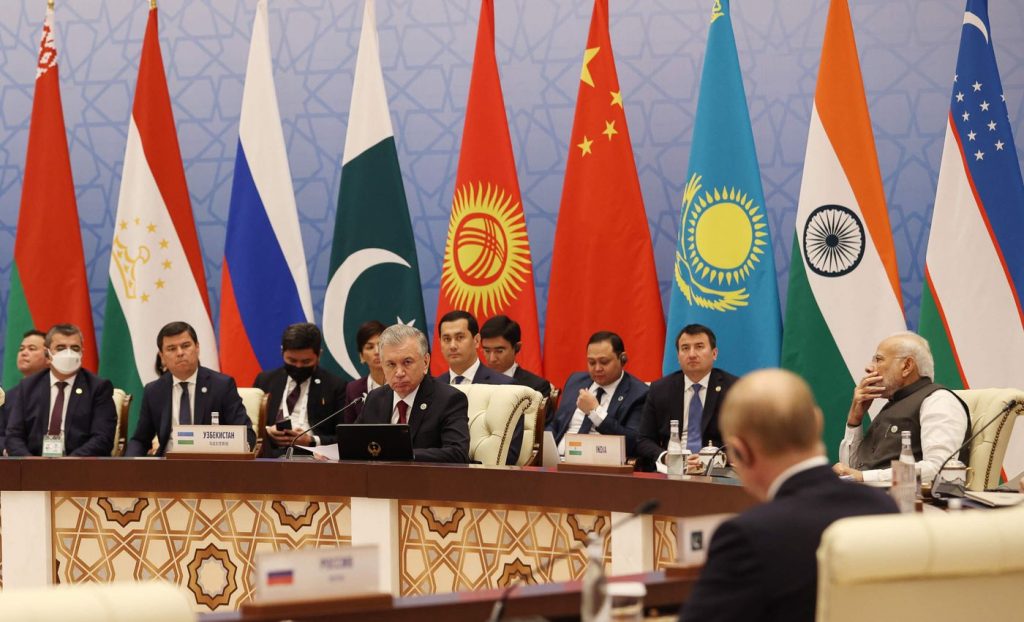
Each member country of the SCO uses the organisation to promote its foreign policy, economic, transport and logistics and other interests. There are the interests of China, there are those of India, there are those of Russia, and there are those of every country that enters the organization as a member, observer or dialogue partner. And this is natural…
However, interests often create a tangle of contradictions between countries. This is the case with China’s contradictions with India. And it is not just the long-standing border disputes, the last bloody aggravation of which occurred in 2020, and now Beijing poses an existential threat to national security for New Delhi. Recall that it was after these events that India’s cautious pivot to the West began. Another factor in the controversy has been India’s desire to expand its ties with Central Asian countries. We have already noted that India continues to boycott China’s Belt and Road Initiative. Experts from India believe that China is putting pressure on the SCO states to adopt in official documents and disseminate as widely as possible much of its terminology and its understanding of international events.
What is meant here are such well-established statements as “a new type of international relations”, “community of common destiny”, “three forces of evil”, “Belt and Road” and others that have been expounded at the congresses of the Communist Party of China. Meanwhile, the “Chinese terms” being passed off as Shanghai common terms can be opaque and ambiguous. New Delhi is also unhappy with China’s plans for the China-Pakistan Economic Corridor, which runs through the disputed territories of Kashmir. The Indian side emphasises that most of the infrastructure projects under the Belt and Road can be used, including for military purposes. The active penetration of Chinese capital into countries such as Bangladesh, Myanmar and Sri Lanka is also a cause of concern for India. The Iranian issue in the SCO, which has problems with some Arab countries, remains an obvious and ill-conceived problem. Turkey, Armenia and Azerbaijan, who joined the SCO as partners, carry with them the challenges of the South Caucasus.
Beijing and Moscow also have their own contradictions. Even Belarus, which has recently joined the SCO, will face different readings of its participation in the SCO with Moscow. The Kremlin expects Belarus to be one of the instruments for building the so-called Eurasian security system that Moscow is trying to construct. Lukashenko has more of an economic interest in the SCO, as Belarus was under sanctions earlier than the Russian Federation and is in urgent need of interaction with the countries of Central Asia and Asia as a whole.
All these nuances undoubtedly harm the practical effectiveness of the organisation, adding only to the perceived formidability of its international reputation. Therefore, the SCO is unlikely to turn into a practically effective organisation in the near future. Today, the SCO resembles a mini-UN in its ineffectiveness. It has never been able to turn into an effective structure to implement the number of proposals that are voiced annually by the leaders of the countries. Last year, during the New Delhi summit, Kazakh President Kasim-Jomart Tokayev admitted that over 20 years of the SCO’s existence, it had failed to implement a single major economic project under the auspices of the organisation. In modern conditions, the prestige and effectiveness of any international organisation is measured by the quantity and quality of multilateral projects implemented, as well as tangible results in one or another area.
In this aspect, the main tangible result of the SCO, as experts note, is the resolution of border issues back in the days of the Shanghai Five. Since then, unfortunately, the organisation has not implemented a single multilateral project, limiting itself to activities at the declarative level and increasingly turning into a “discussion club” of member countries, as well as countries showing interest in the organisation, where the leaders of the countries are quite comfortable communicating with each other. We dare say that the most interesting things happen not at SCO meetings or in declarations, but on the margins of the summit, where bilateral meetings of the leaders take place.
It is therefore no coincidence that it is important for the Central Asian states to be able to establish contacts with the leaders of the SCO member states. For example, Russia’s leader met with the Mongolian leader to discuss cooperation in the energy sector. And in his conversation with Ilham Aliyev, Vladimir Putin suggested considering the prospects of developing the North-South transport corridor, which is also important for Iran. In addition, for many SCO member states, Russia’s international isolation has become a great opportunity for their own capitalisation by buying natural resources from Moscow at low prices. In this, Russia is very reminiscent of the Soviet Union, which in its time also generously gifted developing countries in return for influence in one region or another.
China’s position in the SCO has also clearly evolved. Over the past few years, the international situation for China has changed. Beijing has come under greater international pressure as the US views it as its main strategic adversary. Therefore, China is trying to modernise the role of the SCO, expanding its functions from regional to global level. Therefore, both China and Russia look at the SCO as a platform through which to spread their views on ideological frameworks, which is what they are actually using. And in this sense, Russian-Chinese interests within the SCO generally coincide. Both countries are trying to promote the organisation in order to secure their influence over the region and the Global South and to prevent the West from dragging it to their side. Moreover, they want the SCO to be seen as a big bloc that can no longer be ignored. With all these countries joining, China and Russia want to show that there are many supporters of their world view
For Russia, now in its third year of a full-scale war against Ukraine, the SCO has become an important diplomatic platform for Putin, as well as a platform to demonstrate that he is not isolated on the international stage. And as China’s relations with the US have deteriorated sharply, Beijing is now less concerned that the SCO will be seen as an anti-Western organisation. Russia, for its part, has generally accepted the role of junior partner in the tandem and has generally accepted China’s growing influence in Central Asia as inevitable. The Kremlin is only trying to secure spheres of influence where China’s presence is still negligible and where China has no legal and real tools to advance its interests. This includes Vietnam, but Russia’s attempt to get into the “Chinese vegetable garden” called North Korea, where Putin went on an official visit, has caused Beijing’s jealous irritation.
Even if in such a “skewed” form, the rapprochement between Russia and China has worried India, so much so that Narendra Modi made his first international visit to Moscow after being elected prime minister, despite Washington’s indignation. This is a tangle of contradictions, which shows that within the SCO many countries have fundamentally different views on almost everything. And it is impossible to imagine what scenario could, for example, make India and Pakistan postpone their problems and mutual conflict for the sake of something else.
Despite the SCO’s vigorous speeches about undeniable progress, today it is at a crossroads. On the one hand, with its expanded membership, the SCO claims to be a unique systemic integrator of Eurasia, within which key players will coordinate their efforts. On the other hand, the SCO’s institutional weaknesses, while diluting the organisation’s core by admitting new members, create the risk that the Shanghai alliance turns into a very amorphous structure. The concept of the organisation proposed by the SCO founding fathers in 2001 needs to be improved and adjusted to new realities and emerging opportunities. Critics of the SCO point out that despite the signed joint declarations on cooperation in various spheres – from economy to regional security – the Shanghai Cooperation Organisation has more of a diplomatic significance than a practical one. Therefore, the organisation’s development strategy should be more focused on effective practical cooperation between the states that make up the SCO “family”. It may even become an expected response to key international challenges. In other words, the organisation must not only adapt to new realities and upcoming challenges, which are very difficult to predict, but also be able to “look beyond the horizon” of current trends in global development. Only such an approach will be able to give the SCO a “second wind”….

